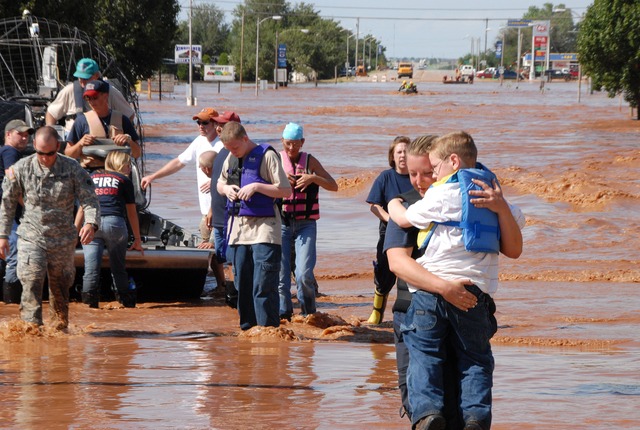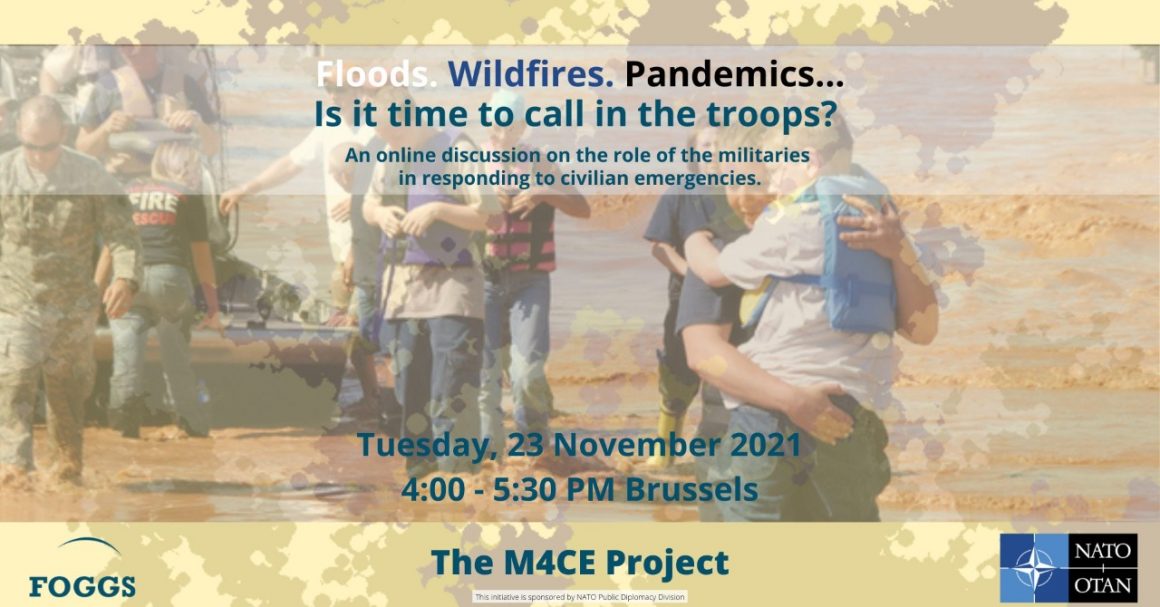By Daniel Orth and Lauren Brennan
At the Foundation for Global Governance and Sustainability (FOGGS) we appreciate the role that military personnel and equipment can play and have already been playing in areas struck by natural or human-made disasters ranging from pandemics, like COVID-19, to floods, forest fires, hurricanes, earthquakes, industrial accidents and oil spills. We believe that this role has to be highlighted for policymakers and the public and can be further improved on the basis of best practices that need to be collected and shared broadly. That is why we set up the Militaries for Civil(ian) Emergencies (M4CE) Project, for which we received initial support from the Public Diplomacy Division of NATO. You can find more information on the project here.
This article distils key messages from interviews that we conducted as part of the M4CE Project. The interviewees were key stakeholders, specialists, academics, and leaders from a variety of backgrounds. They included Dr. William Banks, Syracuse University College of Law; Mr. Alfonso Lozano Basanta, Emergency Response Coordination Centre (ERCC), European Commission; Dr. Nora Bensahel, Johns Hopkins University School of Advanced International Studies; Mr. David Burke, Team Rubicon; Mr. Nelson Castano, International Federation of Red Cross and Red Crescent Societies (IFRC); Mr. Craig Fugate, formerly with the US Federal Emergency Management Agency (FEMA); Mr. Josef Reiterer, Civil-Military Coordination Service, Office for the Coordination of Humanitarian Affairs (OCHA), United Nations; and Mr. Nikos Votsios, retired Brigadier General with the Greek Armed Forces.
The interviews, all of which have been recorded and can be accessed on the FOGGS YouTube Channel, centred around three main questions:
- What has been your experience with civil-military coordination in addressing natural and human-made, non-conflict-related emergencies?
- What are the key lessons learned and current challenges?
- What trends do you see developing in the use of military resources in addressing natural and human-made, non-conflict-related emergencies at national and international level?
From each interview, the resounding message remains clear: the frequency and cost of disasters is only rising. Without normalizing and streamlining the use of military personnel and assets into disaster response efforts, the lives of civilians are increasingly at risk. Mr. Craig Fugate asserts in his interview that the civil-military relationship must be strengthened, and the legislative authority and ground rules must be explicitly laid out before the next global disaster. And yet, in the face of looming catastrophe, the overall tone expressed during all of the interviews still remains optimistic. By building on the lessons learned from the Covid-19 pandemic and tackling the critical challenges posed, more effective military support for disaster relief efforts can be accomplished.
Throughout the interview process, we identified several critical challenges that must be addressed to ensure effective and equitable civil-military relations. First, the issue of legal frameworks and budgets must be addressed. Mr. Josef Reiterer contends that most Disaster Managements Acts become outdated “before a new mega-crisis hits.” The Covid-19 pandemic laid bare this issue, but it now presents the opportune time when we can rewrite and implement the necessary legislative framework. Moreover, the issue of who is to pay for the use of the military in civilian emergencies is already complicated, but this complexity is even more pronounced in federal systems like that of the USA, where recent large-scale disasters demanded multiple federal actors to operate at state level, as explained by Dr. Nora Bensahel.
The second challenge ahead is related to the architecture of international coordination mechanisms. From the conversation with Mr. Nelson Castano, it becomes clear that generic international coordination alone is not sufficient. For each region there is a need for customized agreements and partnerships with local humanitarian actors who must be seamlessly integrated into disaster response efforts. Moreover, international coordination mechanisms, such as the UN, NATO, and the EU, must be committed to prioritizing impact over publicity.
Finally, perhaps the most significant challenge ahead relates to perceptions, both in terms of public opinion towards military involvement in civilian emergencies, and in terms of the military’s opinion about working alongside civilian authorities. As both Dr. William Banks and Mr. David Burke remind us, those nations with a complicated history of military abuse of power may hold deeply embedded but well-founded mistrust towards the military. Mr. Nikos Votsios raises the important question of whether militaries can be “convinced that providing assistance to state services and local communities in case of emergencies and disasters is in their mission” or constitute a distraction from the armed forces’ “real tasks.” If we can choose whether to invest in the military or the civilian sector for emergency response, then we should reinforce “developing capabilities” within the civilian sector, argues Mr. Alfonso Lozano Basanta.
Overall, all of those interviewed emphasized the importance of respecting each country’s legal framework for civil defence operations and involving the military under the civilian authorities. As the need to draw on reinforcements from the military increase as a result of successive crises, mandates and operating procedures may be revisited. One should always keep in mind, though, the distinct roles of the civilian and the military arms of the public sector, and should also involve civil society and volunteers in roles they can play well. Moreover, we are reminded that the coordination of military and civilian authorities working side-by-side is not only a logistical challenge, but also a question of legitimacy, accountability and safety. Discussions about the chain of command in this form of cooperation need to be an integral part of the way forward. Finding the right coordination mechanisms to be prepared for disasters and emergencies of never-before-seen size and form will demand firm commitments and expansive groundwork.
To explore these themes further, FOGGS is hosting an online discussion with the title “Floods. Wildfires. Pandemics… Is it time to call in the troops?”, on Tuesday, 23 November 2021 from 16:00 hrs to 17:30 hrs Brussels time. Invited experts from various countries and organizations, including several of those interviewed, will share good practices and will discuss questions related to the legal framework and modalities of civilian-military cooperation in responding to non-military emergencies, command and control issues, budgets and training, cross-border support and coordination, among other things.
You can register below to attend the event, ask your questions and contribute your comments. The event will also be broadcast live on the FOGGS Facebook page.
REGISTER HERE: https://lnkd.in/e3kNY-ny
If you need assistance with the registration process or are experiencing technical issues, please contact info@foggs.org
Support for The M4CE Project has been provided by the NATO Public Diplomacy Division. For more information on The M4CE Project, please visit our website: https://www.foggs.org/the-m4ce-project/




